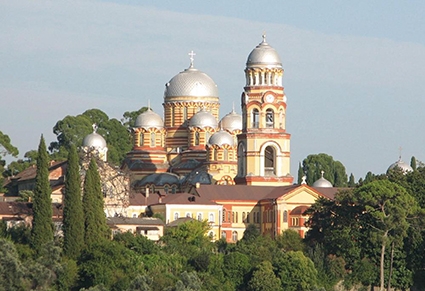Church vs Church
Op-Ed
Once again, after a 6-month break, the Church becomes again a major puzzle in Georgian politics. The events surrounding the Davit Gareja monastery complex were still hot when a religious hassle developed in occupied Abkhazia, seeing supporters of Russian Patriarch Kiril confronting those of Bartholomew I of Constantinople. Most important in the whole story is that where the Davit Gareja problem is more or less resolvable, the dispute in the breakaway region goes beyond the capabilities of Georgian political officials and the clergy. Nevertheless, in order to discharge the current situation, Moscow is demanding a sacrifice from the Georgian Church.
Moscow demanded a straightforward answer to the ecclesiastical wrangle last year, when Metropolitan Hilarion of Volokolamsk visited Tbilisi for a few hours. During his meeting with Ilia II, he made sharp statements against the so called “ecclesiastical separatists” of Abkhazia. He said, “The group which has conquered the monastery of ‘New Athos’ is still holding its position and nothing has changed in this regard.” With this meeting, he once again proved that the top ecclesiastical hierarchy of the Russian Church is concerned about the fate of the New Athos Monastery named after Simon Kananeli, especially that the latter is considered one of the Holinesses of the Russian Orthodox Church. It was exactly in the garden of said Church where the main drama took place this week: the so-called Abkhazian clergy gathered once again and discussed the letter addressed to Patriarch Kirill of Moscow. The meeting ended with a confrontation. For years, the church of the occupied Abkhazia has been divided between the Abkhazian ecclesiast Dorothei Dbar, who represents the “main church” of Abkhazia and supports Bartholomew I of Constantinople, who opposes the head of the pro-Russian church group Besarion Aplia. Dbar and his supporters believe that the autocephaly of the de-facto Abkhazian church should be restored, even though they will need to take a long and difficult road to get there. Contrary to that, Aplia and his group think that they will be much safer in the bosom of the Russian Church. The opposing “gangs” have a history of silent confrontation and tensions, it was this March when the first meeting between the parties was finally held in the New Athos, where they discussed the reasons for the conflict and elaborated on the need for mutual cooperation “to attain the independence of Abkhazian Orthodox Church.” The meeting proved unfruitful and the parties remained on opposing sides, as before.
Naturally, the de-facto government of the occupied Abkhazia backs Dorothei Dbar’s group, as their major goal is not joining Russia. At every demand from Moscow asking them to hand over the New Athos to Russia, the heads of separatist regime wave their hands theatrically, saying: “What can we do, we can’t enter the holy Heaven with tanks and throw out the priests, can we?”
A former thief-in-law and an active participant in the genocide against the Georgians, Besarion Aplia has formally kept relations with the Georgian Church, but arbitrarily declared himself “Leader of the Church of Abkhazia" and the Abkhazian Diocese as the “Abkhazian Orthodox Church.” But the Georgian Church did not excommunicate him for reasons of diplomacy. For the last 25 years, Moscow has been asking Georgia to give up the New Athos. Although all they got was refusal, in 2011 the parties were able to come to an informal, undocumented agreement which stated that the New Athos would be under de-facto double ruling, which meant that The Russian Patriarch, who recognizes the inviolability of the canonical ecclesiastical territory of Georgia, would send a Russian clerk as the leader of the church, and the Georgian side would not object.
The Holy Synod will meet in a few days and open up chances for Georgian national interests, based on the idea of weakening the Abkhazian separatism as far as possible and creating as many problems for them as possible. Hence, the issue deserves a cautious approach: there aren’t many issues in which Tbilisi can place its own conditions to Moscow, and this threat is clear for the Abkhazian separatists too. Therefore, if we examine the most recent statements, we will see that their stakes lie on the “beneficial idiots,” who are busier puffing out futile emotions rather than taking cynical and pragmatic political action.
By Zaza Jgarkava
Photo: Novoafonsky (New Athos) Monastery in Abkhazia. Source: 02varvara.wordpress.com












